

Columbia American History Online. Contributing teacher: Andrew Meyers Time period: 1940s–2003 Overview This simulation centers on a fictitious conference held today in which three groups of Cold War historians—orthodox, revisionists, and post-revisionists—have come to a scholarly conference to debate the origins of the Cold War.
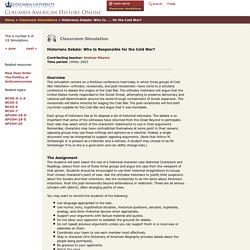
The orthodox historians will argue that the United States merely responded to the Soviet threat, attempting to preserve democracy and national self-determination around the world through containment of Soviet expansion. The revisionists will blame America for waging the Cold War. The post-revisionists will find both countries culpable for the Cold War and argue that it was inevitable. Each group of historians has at its disposal a list of historical witnesses. The Marshall Plan. How did the Cold War develop?
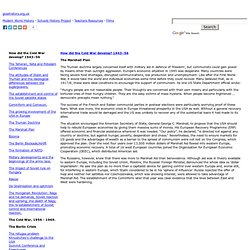
1943–56 The Marshall Plan The Truman doctrine largely concerned itself with military aid in defence of ‘freedom’, but communists could gain power by means other than outright aggression. Europe’s economic sityation in 1945 was desperate. Many countries were facing severe food shortages, disrupted communications, low production and unemployment. “Hungry people are not reasonable people. Multimedia. Who Started the Cold War? An Exchange by Steven J. Cagney. To the Editors : Some comment seems to be in order on a number of important issues raised by Arthur Schlesinger, Jr.’s thoughtful review of Cold War historiography ( NYR , October 25).
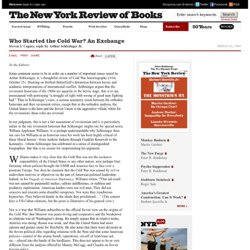
Drawing on Herbert Butterfield’s distinction between heroic and academic interpretations of international conflict, Schlesinger argues that the revisionist historians of the 1960s are squarely in the heroic stage, that is to say, preoccupied with portraying “a struggle of right with wrong of good men fighting bad.” Thus in Schlesinger’s view, a curious symmetry exists between the orthodox historians and their revisionist critics, except that in the orthodox analysis, the United States is the hero and the Soviet Union is the aggressive villain, while for the revisionists, these roles are reversed. In my judgment, this is not a fair assessment of revisionism and it is particularly unfair to the one revisionist historian that Schlesinger singles out for special scorn, William Appleman Williams. Steven J. 30-2 Sample Chapters. Www.oupcanada.com/documents/secure/education/30-2/30-2 TR Ch 8.pdf.
Cuban Missile Crisis. At the beginning of September 1962, U-2 spy planes discovered that the Soviet Union was building surface-to-air missile (SAM) launch sites.
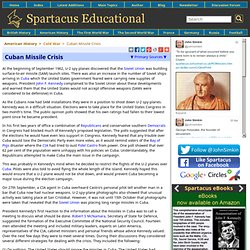
There was also an increase in the number of Soviet ships arriving in Cuba which the United States government feared were carrying new supplies of weapons. President John F. Kennedy complained to the Soviet Union about these developments and warned them that the United States would not accept offensive weapons (SAMs were considered to be defensive) in Cuba. As the Cubans now had SAM installations they were in a position to shoot down U-2 spy-planes. Kennedy was in a difficult situation. In his first two years of office a combination of Republicans and conservative southern Democrats in Congress had blocked much of Kennedy's proposed legislation. This was probably in Kennedy's mind when he decided to restrict the flights of the U-2 planes over Cuba. . (1) Do nothing. . (2) Negotiate.
. (3) Invasion. Activity2.swf (application/x-shockwave-flash Object) Cold War Revision. The USA and the USSR as World Superpowers, 1945-1963 These revision notes were put on the web by Redruth School, Cornwall, in 2006.
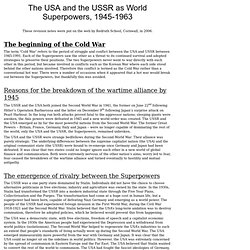
GCSE Bitesize - The Yalta and Potsdam conferences. GCSE Bitesize: Summary. History - World Wars: President Truman and the Origins of the Cold War. Lecture 14: The Origins of the Cold War. There are now two great nations in the world, which starting from different points, seem to be advancing toward the same goal: the Russians and the Anglo-Americans. . . .
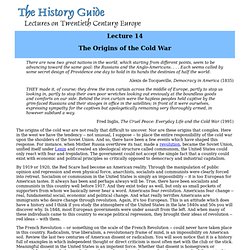
Each seems called by some secret design of Providence one day to hold in its hands the destinies of half the world. Alexis de Tocqueville, Democracy in America (1835) THEY made it, of course; they drew the iron curtain across the middle of Europe, partly to stop us looking in, partly to stop their own poor wretches looking out enviously at the boundless goods and comforts on our side. Karl Asher Sinews of Peace , (the Iron Curtain Speech), Winston ...